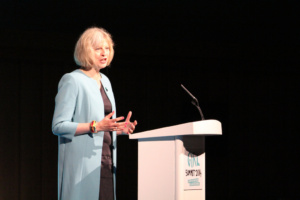Theresa May prepares to lead London into the future: Op Ed
Tomorrow, a new era begins. Theresa May will be Britain’s second female Prime Minister, and the first leader of an independent Britain since 1973. London’s electronic trading sector has a great future and will go from strength to strength.

Here in London, tomorrow will be a poignant day indeed.
Tomorrow is the day that Britain will gain its second female Prime Minister, who follows calmly and collectedly in the footsteps of one of the most revered leaders of all time, Baroness Margaret Thatcher.
As Theresa May makes her way to 10 Downing Street, where she will assume the position of being the first Conservative Prime Minister in 50 years to preside over an independent Britain, all eyes are on the absolute crown of Britain’s booming and highly advanced business sectors, that being London’s Square Mile and Canary Wharf – home to the largest financial center in the world.
Far from being a pen-pushing bureaucrat with little business acumen, Mrs. May has a longstanding relationship with the City, albeit during the difficult 1970s where socialist trade unions ruled the roost in industrial cities, and the gulf between the traditional manufacturing businesses of the Midlands and the North were at complete odds with the pinstripe-suited grandeur of London.
Between 1977 and 1983 Mrs May worked at the Bank of England, and from 1985 to 1997 she was a financial consultant and senior advisor in International Affairs at the Association for Payment Clearing Services.
Nowadays, the Association for Payment Clearing Services is called UK Payments Administration, and covers risk management, resilience and compliance, as well as communications and marketing as well as the financial sector at large.
These are not only mainstays of British industry, but commercial business sectors in which Britain leads the world.
The imminent exit from the European Union by Britain which now lies in the hands of Ms. May in order that she actions Article 50 and proceeds, represents a giant shackle having been removed from the UK economy, and the stimulation of growth an entrepreneurism is a massive focus in Britain these days.
Here in London today, it is evident that the young people who are designing and bringing to fruition new financial technology projects in Silicon Roundabout are urbane, sophisticated and extremely knowledgable.
The will to start a business and push the boundaries of technological creativity is alive and well in Britain.
Britain’s FX industry will continue to flourish under fiscally conservative and the pro-commercial progress leadership of Mrs. May.
There has been a vast amount of media speculation with regard to how the next Prime Minister, post Brexit, will ensure that London remains the place for banking, electronic trading and institutional financial business.
It is clear, by a substantial margin, that absolutely no firms will relocate to the European Union, and that London will go from strength to strength as the world’s capital for advanced and highly sophisticated financial markets entities, whether the 6 banks in Canary Wharf that produce 49% of all global FX Tier 1 interbank order flow, the institutional prime brokerages that have enormous capital bases and provide the world’s electronic brokerages with aggregated liquidity, or the 23 year old geniuses of Shoreditch who are designing, whilst sponsored by vast financial institutions, the latest automated technology which will power the financial markets in future.
Mrs. May, therefore, has the task of continuing to further the cause of British innovation, and to ensure that the world’s jewel in the crown of financial services continues to flourish and that the next generation of its thought leaders and innovators look forward to a very bright future.
Mrs. Thatcher most certainly had this in mind 30 years ago. Now in today’s technological age, it is down to Mrs. May to ensure that London not only retains its number one position but continues to further its cause.
Photograph courtesy of DFID – UK Department for International Development









